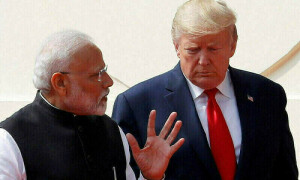ROME, June 4: UN officials announced almost $3 billion of new emergency aid to help ease the global food crisis on Wednesday, but UN chief Ban Ki-moon warned up to $20 billion a year would be needed.
“We simply cannot afford to fail,” the UN secretary general said at the food security summit in Rome, which is grappling with how to stop the crisis escalating. “Hundreds of millions of people expect no less.”
The extra resources that might be required would cost between $15 billion and $20 billion a year, Ban told a news conference.
New funding totalling some $2.7 billion was announced on the second day of the summit in Rome, where Ban has already demanded a 50 per cent increase in food production by 2030.
Food prices have doubled in three years, according to the World Bank, sparking riots in Egypt and Haiti and in many African nations. Brazil, Vietnam, India and Egypt have all imposed food export restrictions.
Leaders at the summit were finalising an action plan to be unveiled on Thursday, Ban said, while warning that it would require “substantial and sustained financial and political commitment.”
John Holmes, head of the UN task force on the food crisis, said a “broad consensus” was building around the action plan, which should be completed by the end of this month for presentation at the Group of Eight meeting in Japan.
World Bank President Robert Zoellick called for the lifting of trade barriers that contribute to food price inflation. “We need an international call to remove export bans and restrictions,” he said.
“These controls encourage hoarding, drive up prices and hurt the poorest people around the world who are struggling to feed themselves,” he said.
Humanitarian charity Oxfam spokesman Alexander Woollcombe said that criticising developing countries’ trade barriers distracted from the need for wealthy countries to re-examine their own trade policies.
“Rich countries would do better to focus on fixing their own policies instead of criticising developing country governments,” he told AFP.
Former UN secretary general Kofi Annan put his signature to a new initiative partnering the three UN food agencies with his Alliance for a Green Revolution in Africa (Agra).
“By unifying our efforts we can drastically step up our support for Africa’s smallholder farmers,” said Annan, stressing that the alliance would “focus on the small-scale farmer, not to run them out of business.”
WFP executive director Josette Sheeran announced the $1.2 billion in new emergency aid. “With soaring food and fuel prices, hunger is on the march and we must act now,” Sheeran said in a statement.
The Islamic Development Bank would spend $1.5 billion on agriculture in the poorest countries, Food and Agriculture Organisation director general Jacques Diouf announced.
Belgium pledged 18 million euros in food aid due to the crisis, as well as 500,000 euros for Ethiopia. “Food is a right for people, and a duty for governments,” said cooperation and development minister Charles Michel.
The cost of major food commodities has doubled over the last couple of years, with rice, corn and wheat at record highs. The soaring prices threaten to add 100 million more people to the 850 million already going hungry.
Indonesian farmer Henry Saraghi told reporters he blamed free markets for destroying soybean production in his country. “My country became dependent on imports when they were cheap, and now the price is high,” said Saraghi, who leads an international farmers’ movement but also runs a family farm.
“We must be allowed to protect our farmers so that people can feed themselves, so farmers can supply local markets ... we must continue to give farmers subsidies.”
Michael Windfuhr, who is with a Christian group promoting rural development, said small farmers in poor countries would never be able to compete in free markets against multinational companies in Europe or the United States.
“What we need is not more free trade because free trade was often part of the problem,” Windfuhr said. “The EU is currently exporting beef and other products at prices that many African farmers cannot compete with at all.”—Agencies
















































Dear visitor, the comments section is undergoing an overhaul and will return soon.